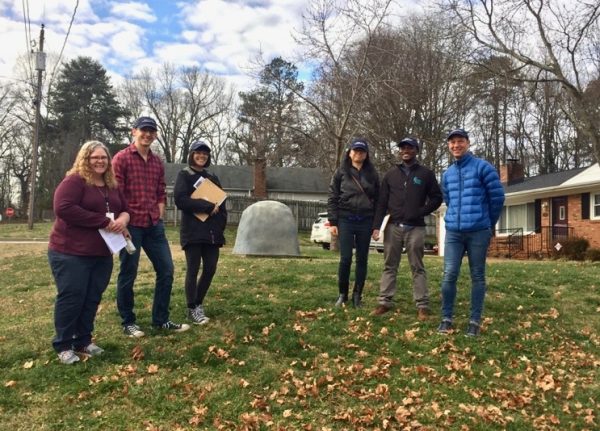Update: Local Coverage of CAGIS Outreach Efforts On Well Water Safety In Gaston County Set To Expand

12/15/2021 Update: WSOC just ran a segment on our efforts to reach private well owners in Gaston County. See the coverage at:
11/16/2021 (Charlotte) A CAGIS-based team of researchers and students will work with residents and county health officials to boost the number of people doing tests regularly and improve the sharing of data. A $49,999 award from the state Environmental Enhancement Grant program will support the efforts, which will begin in summer 2022.
While groundwater typically is pure, contaminations from natural and manmade sources can pose health risks. Contaminants can come, researchers say, from industry pollution, leaks from landfills, septic tanks, fertilizers, coal ash ponds, and animal waste, while other contaminants like arsenic can occur naturally.
“Very few residents do frequent testing for water contamination, in large part because they are not aware of the need and because of the cost,” said project leader Éric Delmelle, a faculty member in the Department of Geography and Earth Sciences. “This new project will educate homeowners and renters on the need to test their well water and will create tools so they can share their test findings. By essentially crowdsourcing the data, the residents can access time-sensitive groundwater risk maps and other information to protect themselves and their communities.”
The project will build upon the Healthy Wells initiative, funded by the Centers for Disease Control and Prevention, with additional funding from the Water Resources Resarch Institute of the UNC System. Since 2015, UNC Charlotte faculty and student researchers have partnered with the Gaston County Department of Health and Human Resources to create a digitized spatial database of well water quality.
Students and faculty, including Eric Delmelle (far right), visited homes in Gaston County to test the water from a selection of 1,250 wells they had located using over 8,000 paper-based land records. The UNC Charlotte team scoured over 8,000 paper-based public land records dating back to 1980 to locate the private wells. They confirmed the wells’ existence through in-person visits, noting whether the wells were installed, repaired or abandoned.
UNC Charlotte’s Center for Applied GIScience, housed in the Department of Geography and Earth Sciences, will coordinate the project and has led the University’s involvement in the Healthy Wells project the past few years. The interdisciplinary research center uses advanced space-time theories, methods, and technologies in Geographic Information Science to focus on resource and sustainability issues.
“The new award exemplifies UNC Charlotte’s commitment to addressing our region’s unique needs using community-based research and engagement,” said Douglas Shoemaker, the center’s director of research and outreach and a project lead. “Our working group, based in the center, is well known for developing web-based maps that inform stakeholders, but it also is important to understand the barriers to well water safety so that we can tune analyses and outreach to the needs of the community.”
CAGIS Executive Director Wenwu Tang also will provide leadership with the project, which Attorney General Josh Stein commended for its focus on community-centered solutions.
“Clean drinking water is essential to our health and quality of life,” said Stein, when announcing the funding. “I’m hopeful that this grant will help people in Gaston County test their well water and give us a better understanding of their water quality issues.”
See the full article at https://exchange.charlotte.edu/unc-charlotte-research-outreach-efforts-on-well-water-safety-in-gaston-county-set-to-expand/